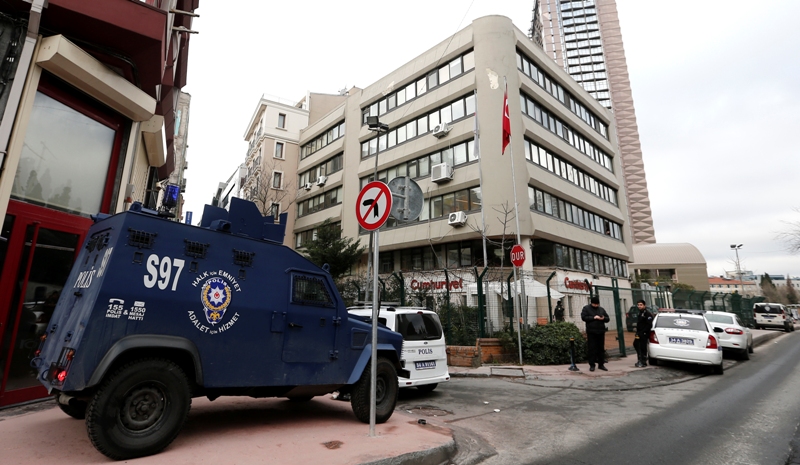The International Press Institute (IPI) today joined observers around the world in condemning the two-year prison sentence handed to two journalists who republished the cover of satirical French magazine Charlie Hebdo featuring an image of the Prophet Muhammad.
An Istanbul court convicted daily Cumhuriyet journalists Ceyda Karan and Hikmet Çetinkaya of “openly encouraging hate and enmity among people via the press” for including images of the cover of the magazine’s first issue after the Jan. 7, 2015 attacks on its Paris offices that left 12 people dead.
The pair had included the image to illustrate columns they wrote expressing solidarity with their murdered colleagues. They were acquitted on a separate charge of “insulting people’s religious values”.
Free expression and press freedom watchdogs across the globe have roundly blasted the decision.
“Blanket censorship, even if people may have a legitimate reason for being offended, is never the answer, and the decision to send these journalists to prison is unreasonable and unjustified,” IPI Director of Advocacy and Communications Steven M. Ellis said. “Turkey is travelling down a dangerous road by allowing those who claim ‘offence’ to silence anyone who disagrees with or criticises them.”
IPI also endorsed a call on Turkey’s government by OSCE media freedom representative Dunja Mijatović “to ensure the safety of the two journalists who have been exposed to severe threats and intimidations for their work”.
Karan and Çetinkaya faced the charges after some 1,280 people – included Turkish President Recep Tayyip Erdoğan and his children – filed criminal complaints. The journalists’ columns appeared in a special Jan. 14, 2015 insert in Cumhuriyet that prompted a police raid on the newspaper’s printing press and led to threats against Cumhuriyet and its staff by Islamists.
As president, Erdoğan has been keen to use Turkey’s expansive criminal insult laws to silence his detractors. In addition to recent efforts to use the laws of Germany and Switzerland against critics in those countries, he has reportedly brought some 2,000 insult cases against people in Turkey since becoming president in 2014. Many of the cases involve a law that provides Turkey’s president with greater protection from criticism than the average person.
Last week, Turkish authorities arrested Dutch journalist Ebru Umar for posting tweets criticising the president. Umar – who also holds Turkish citizenship, which she has since said she plans to renounce – has been barred from leaving the country. The case prompted the Netherlands’ foreign minister this week to warn Dutch nationals who have criticized Erdoğan that they risk arrest if they travel to Turkey and that the Foreign Ministry could do nothing to help them.
It was also one of a series of numerous incidents in recent months in which Turkey’s government has increasingly cracked down on Western journalists. In the latest, authorities on Tuesday detained Finnish writer Taina Niemela on accusations of espionage and communicating with Kurdish militants in south-eastern Turkey. The journalist, who said she had been in Turkey for nearly a year to write a travel book, was the subject of a deportation order the following day. Just one day earlier, authorities denied entry to Turkey-based American freelance journalist David Lepeska.
Last week, authorities in separate incidents denied entry to Greek photojournalist Giorgos Moutafis, who was on assignment for German tabloid Bild, and to Russian journalist Tural Kerimov, Turkey bureau chief for the Sputnik news agency. One week earlier, Turkey’s Telecommunications Authority (TIB) shut down Sputnik’sTurkish-language website citing “administrative measures”. Authorities this month also denied entry to German broadcast journalist Volker Schwenck, the Cairo correspondent of Germany’s ARD TV.
In some cases where journalists have been detained, they are given cursory explanations that they were considered a threat to security or had otherwise been barred from entry. In others, the journalists are given no reason. Lepeska said he received no explanation when he was detained, but Turkish officials have reportedly claimed that he lacked proper press credentials, although he had been living and working in the country for several years.
Whether he could have obtained those credentials is unclear. Turkey’s government increasingly insists that individuals who do not possess official accreditation and official press card issued by the prime minister’s office will not be recognised as journalists. The government has also recently refused to renew the credentials of many European journalists already in Turkey, including, most recently, Hasnain Kazim, of German newspaper Der Spiegel, and Silje Kampesæter of Norway’s Aftenposten.
“If we had not already observed a continuing, years-long deterioration of media freedom in Turkey, it would seem incomprehensible that a member of NATO and the Council of Europe, and a signatory to the European Convention on Human Rights, is selectively barring western journalists from reporting within its borders,” Ellis said.
“Sadly, this development, like the Turkish government’s demands on foreign governments to bring criminal charges against Erdoğan’s critics, shows a clear intent to export repression. Before, authorities seemed content merely to prevent a Turkish-speaking audience from exposure to criticism of Erdoğan’s rule; now, they appear bent on making sure that no one hears it.”
